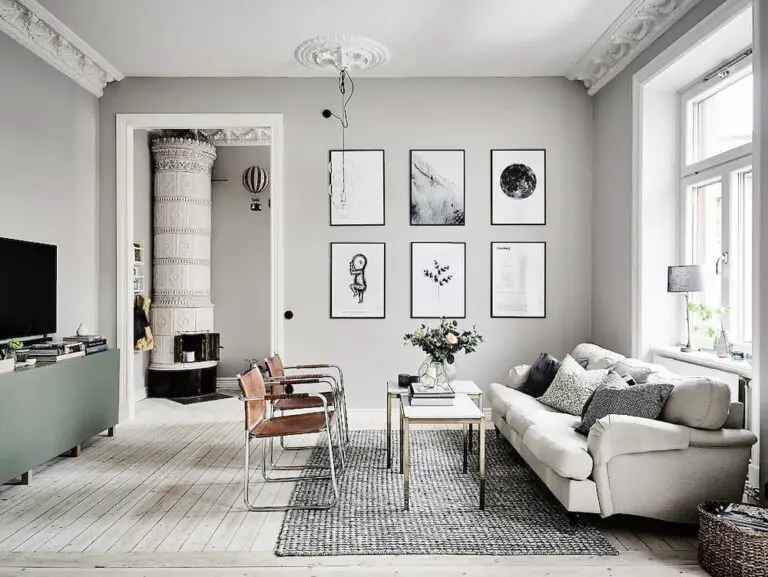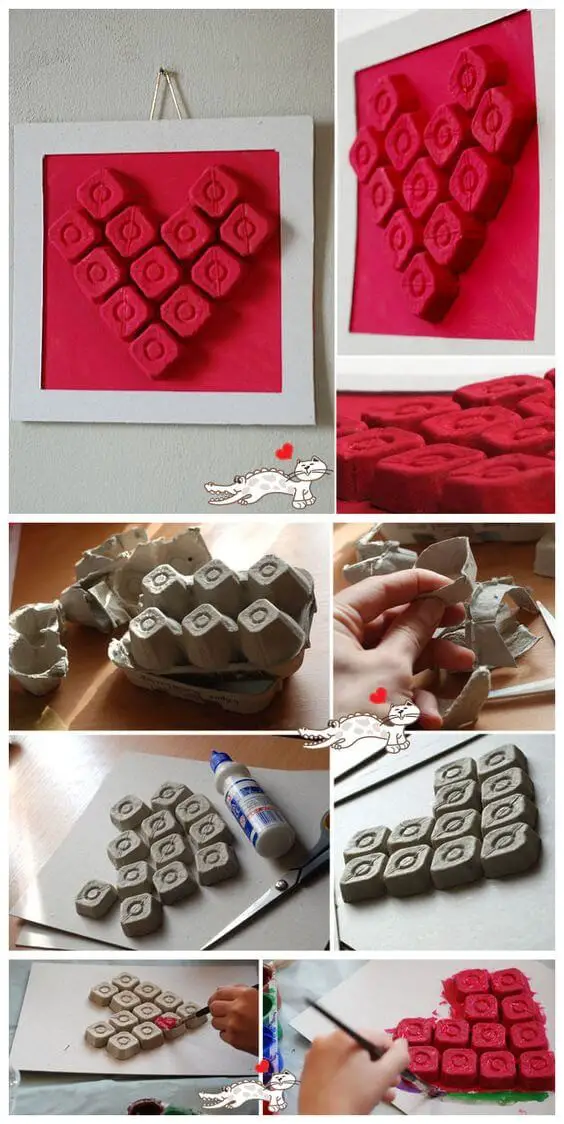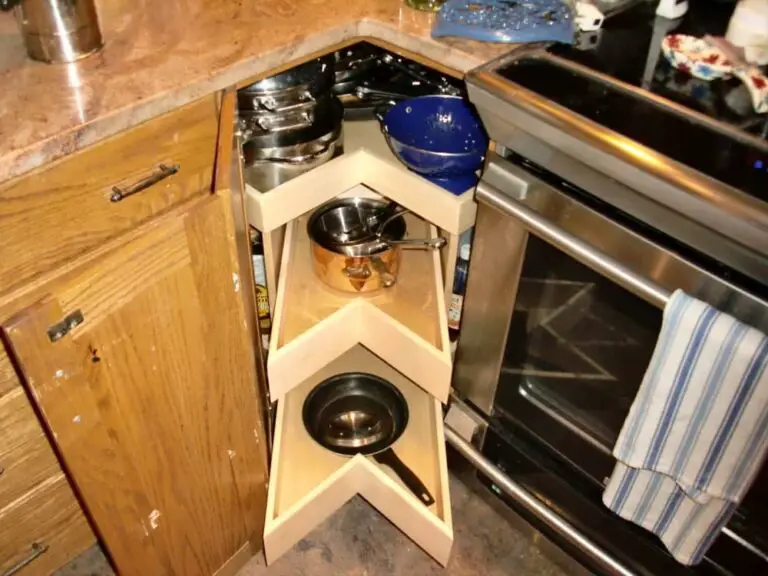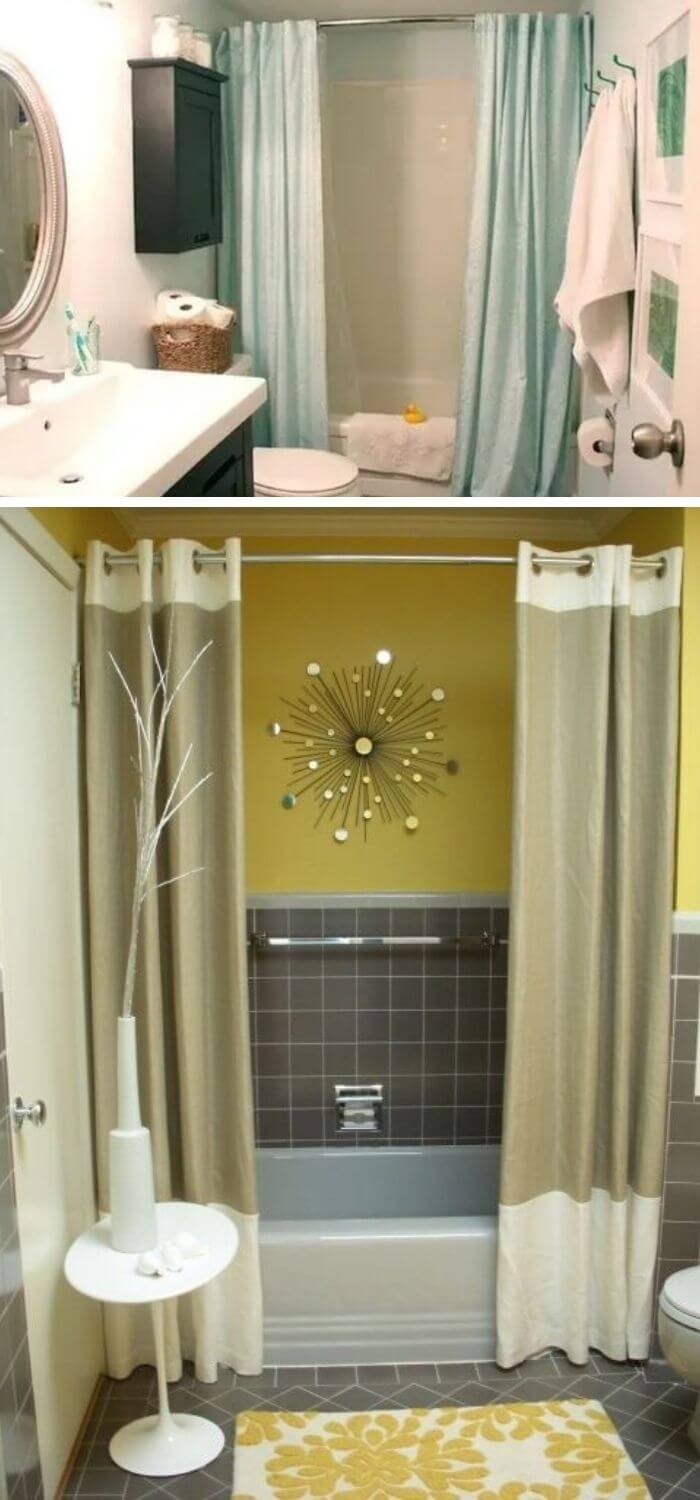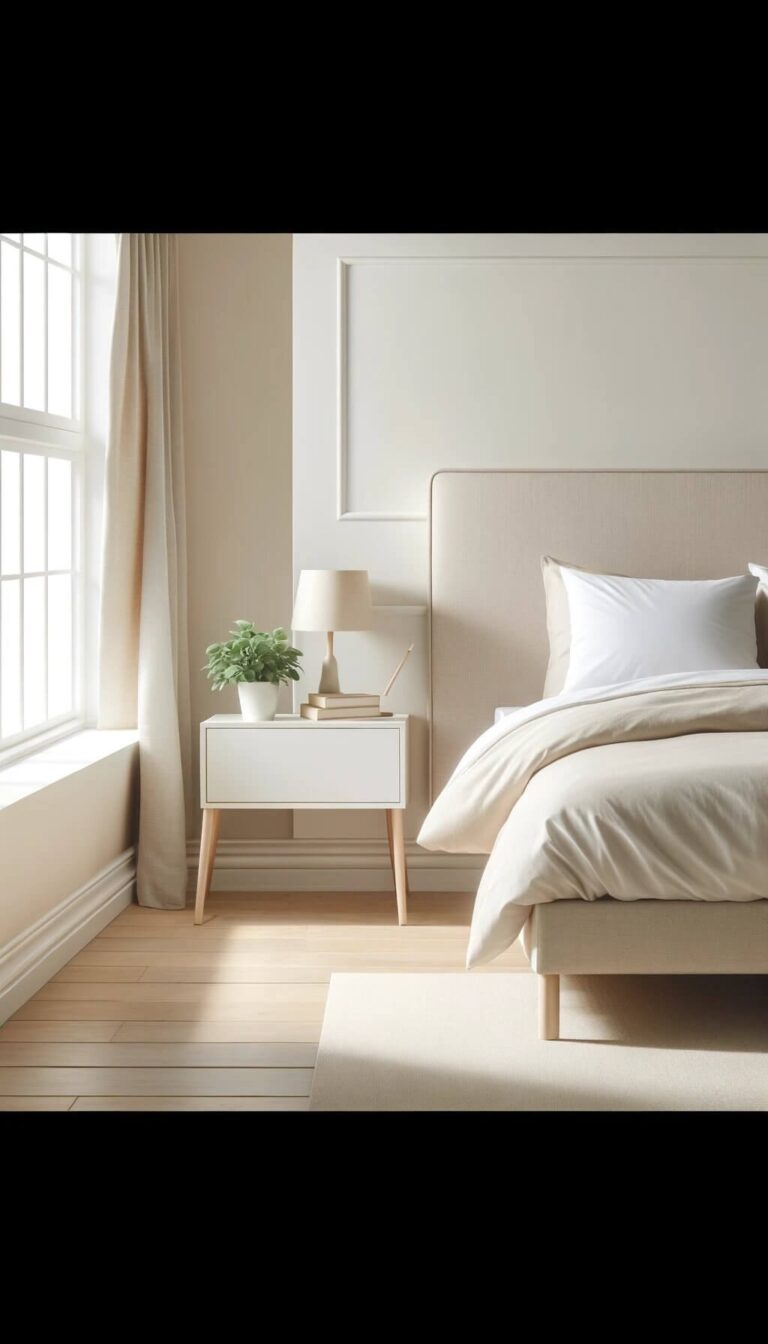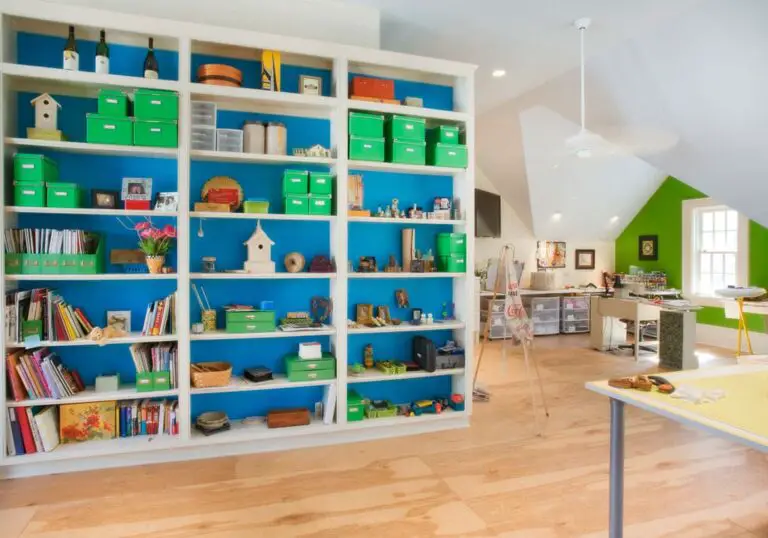Hickory Flooring Reviews: Varieties, Best Brands, Pros And Cons
When it comes to choosing the perfect flooring for your home or office, there are numerous options available in the market. However, not all types of flooring are created equal. Some stand out from the rest due to their unique characteristics and benefits. Hickory flooring is one such option that has gained popularity in recent times. As a type of hardwood, hickory offers an unparalleled combination of durability, style, and affordability.
In this article, we’ll delve into the world of hickory flooring, exploring its various forms, advantages, and disadvantages to help you make an informed decision for your next flooring project. With its natural charm, versatility, and ease of installation, hickory is an excellent choice for anyone looking to elevate their space with a high-quality and long-lasting floor.
What Is Hickory?
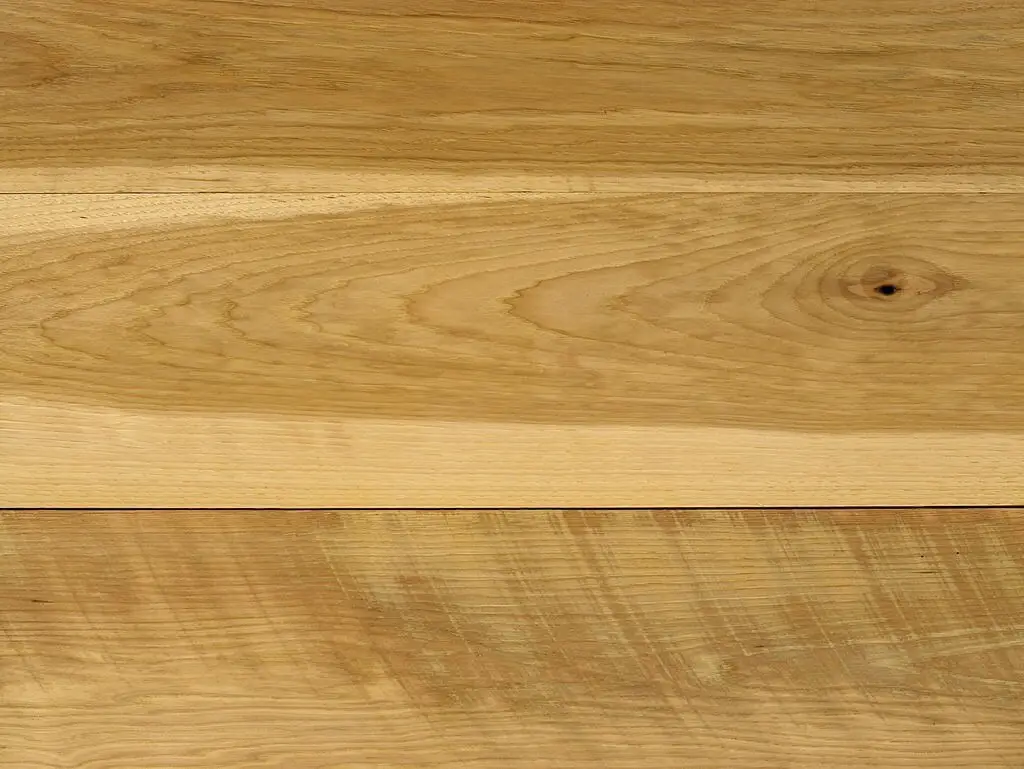
Hickory hardwood is renowned for its dense grain patterns, which imbue floors with an attractive visual appeal. Its color palette showcases a range of hues, from light cream to dark amber, making it an excellent choice for those seeking a unique aesthetic. The Janka rating of 1820 and resistance to wear ranging from 0 to 4000 demonstrate the material’s remarkable durability. One notable characteristic of hickory is its rough grain texture.
Unfortunately, this also means that sanding the flooring is impractical due to the visibility of patches against its light color. Installation can be a challenge as well, since the hardwood is prone to splitting; therefore, it’s advisable to engage an expert or opt for prefinished hickory. The latter comes dry and eliminates concerns about shrinking. Hickory’s durability and shock-resistance make it an excellent choice for installation in any room.
Its appealing look also lends itself well to blending with various décor options, thanks to its rustic feel that complements a wide range of styles. For commercial settings featuring heavy objects, hickory is particularly suitable due to its firmness and resistance to fast wear. To ensure optimal performance, it’s essential to properly maintain and care for your hickory flooring. With the right attention, this exceptional hardwood can serve you well for years to come.
Types of Hickory Flooring
When it comes to hickory flooring, homeowners are often spoiled for choice. With several varieties to select from, each boasting unique characteristics, it’s essential to understand the differences between them. Here, we’ll delve into the various types of hickory flooring and their distinct features.
Solid Hickory Flooring
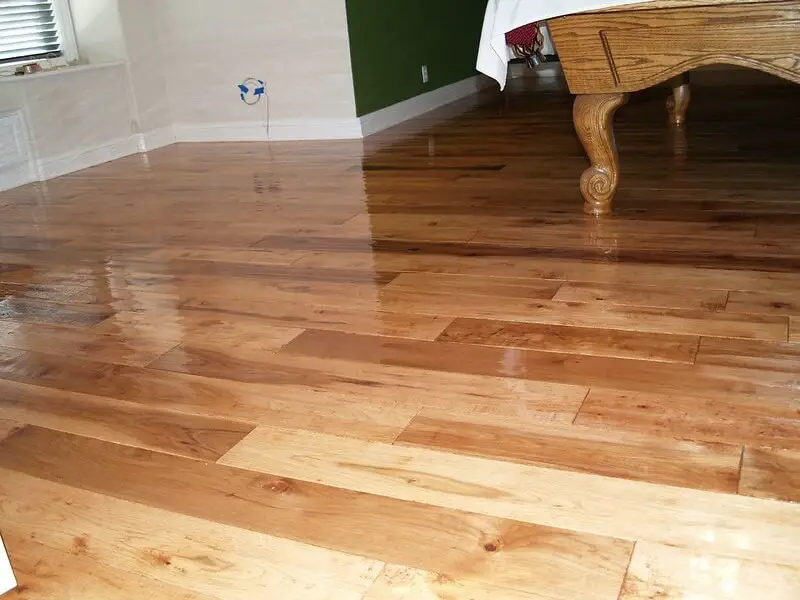
With its distinctive characteristics, solid hickory flooring stands out for its 19mm thickness and board widths ranging from 3 to 5 inches. One of the defining features of this type of hickory is the hand-scraped finishing process, which involves wire brushing with a medium level of gentleness. The result is a natural look that brings a unique charm to any room, making it an attractive addition to any home.
Engineered Hickory Flooring
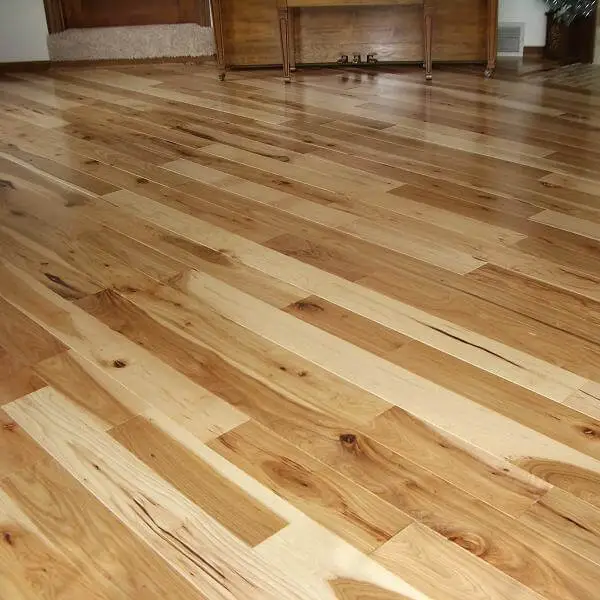
Engineered flooring features a composite design, comprising multiple layers of different materials bonded together to form a robust core. The thickness of this type of flooring can range from 3/8 to ½ inch, with widths typically measuring 5 inches. However, it’s essential to note that these specifications may vary depending on the manufacturer. At the foundation of engineered flooring lies the veneer layer, which is often followed by a fiberboard layer.
One of the primary advantages of engineered flooring is its ability to withstand humidity and moisture without experiencing swelling or other issues. As such, it’s an excellent choice for areas like basements or bedrooms where these conditions may prevail.
Laminate Hickory Flooring
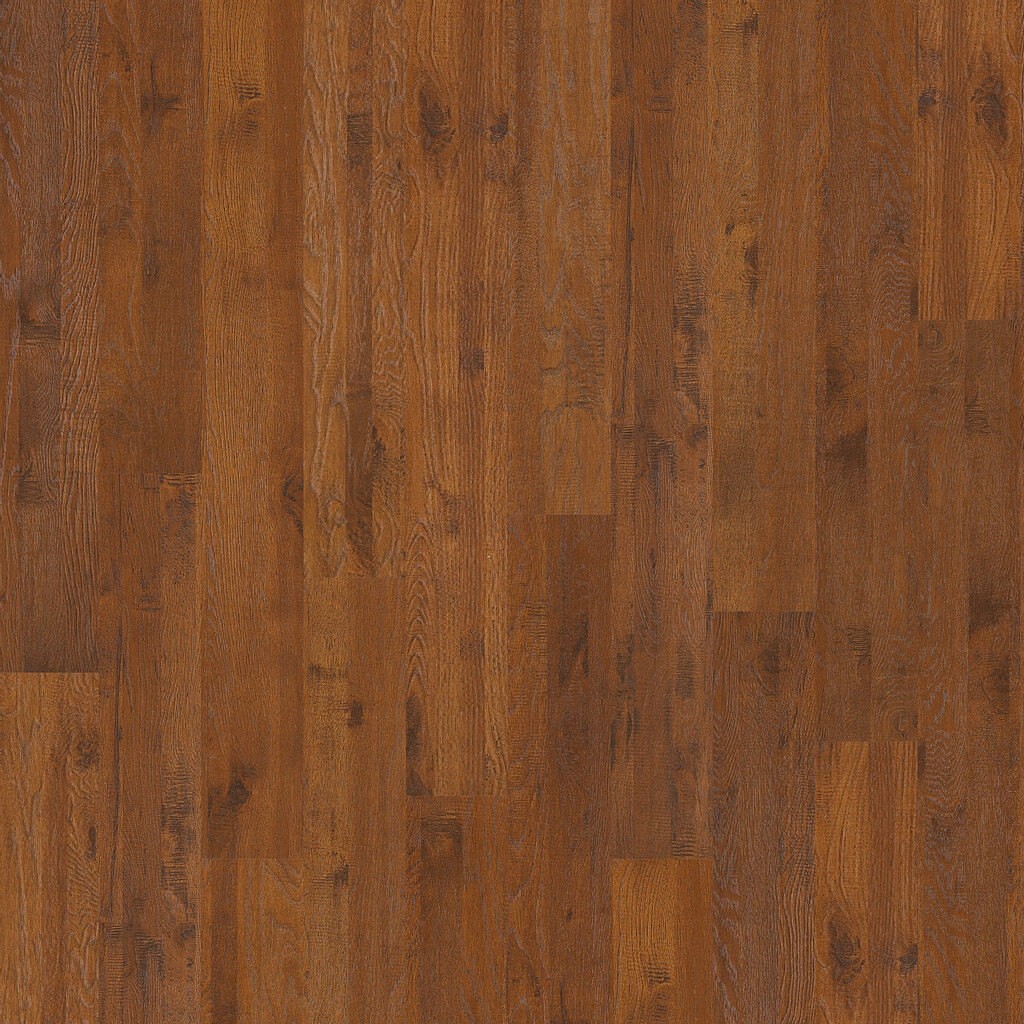
Laminate hickory flooring boasts a unique visual identity, featuring a photorealistic image of hickory wood permanently bonded to synthetic composite lumber. This innovative design combines the natural beauty of hickory with the durability and practicality of manufactured materials. With a thickness ranging from 8-12mm and widths spanning 3 inches to 8 inches, laminate hickory boards offer a versatile solution for home flooring needs.
The resulting floor presents an attractive appearance, characterized by a rich sheen that can withstand wear and tear over time. For further insights into the world of flooring, explore related topics such as Laminate vs Hardwood or Vinyl vs Laminate.
Hickory Flooring Pros
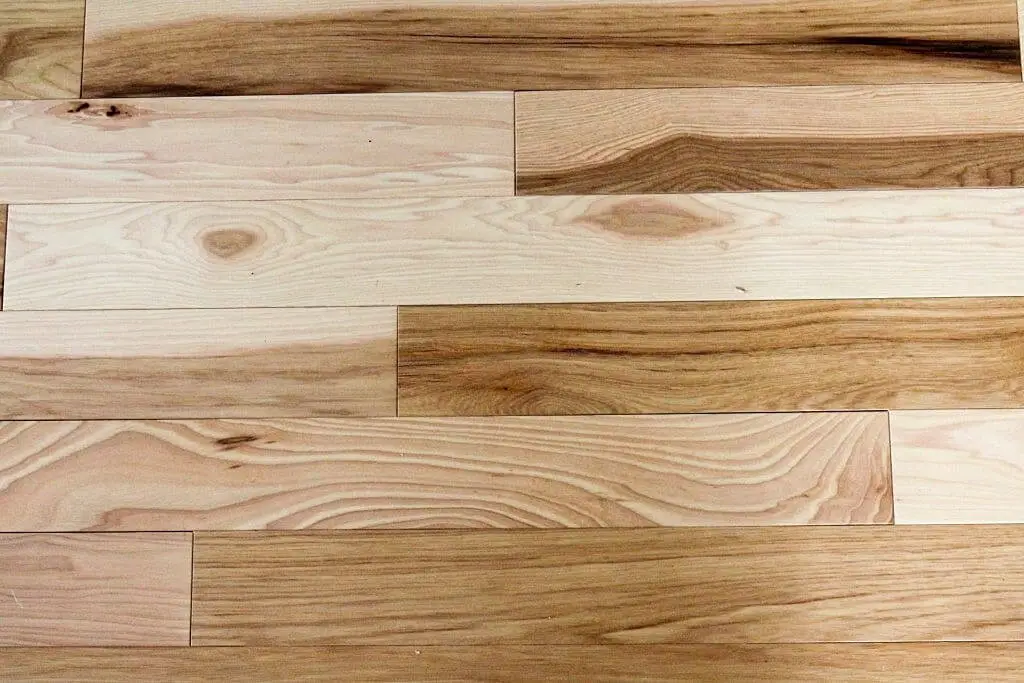
When considering hickory flooring for your home, its numerous benefits and advantages cannot be overlooked. With its unique characteristics, hickory flooring stands out as an exceptional choice. Here’s a look at some of the key advantages that make it a top pick:
It’s Cheap
When it comes to pricing, hickory hardwood flooring stands out for its affordability compared to other options. Not only is it generally cheaper than many other types of hardwood flooring, but it also doesn’t come with additional import charges that can drive up the cost of other materials. As a result, hickory flooring offers a unique combination of natural beauty and value for money, making it an attractive choice for those who want a quality product without breaking the bank.
Strong and Durable
When opting for hickory flooring in your home, rest assured that you won’t need to worry about its longevity. With a remarkable resistance to wear and tear, hickory flooring takes years to show signs of spoilage. Additionally, it’s renowned for being one of the strongest hardwood flooring options on the market, boasting impressive shock-resistance capabilities.
Moreover, hickory’s exceptional Janka rating of 1820 underscores its unwavering durability.
This means you can confidently install hickory flooring in any room within your home without fearing damage or degradation.
Low Maintenance Cost
When it comes to choosing a floor, many homeowners seek options that minimize the need for costly repairs down the line. Hickory flooring, renowned for its durability and strength, is an excellent choice in this regard. With proper care, hickory floors can be refinished every five years or so, ensuring your investment remains looking great with minimal upkeep. Plus, cleaning hickory flooring is a breeze, freeing up more time for you to focus on other aspects of your life.
Has A Variety of Choice?
When it comes to affordable yet stylish flooring options, hickory is an excellent choice. Not only does it offer a range of styles to suit your taste, but it also provides exceptional finishes that can elevate the overall look of your space. If you’re looking for a truly unique and textured finish, solid hickory flooring with its hand-scraped finishing is definitely worth considering. Alternatively, engineered hickory flooring offers a more budget-friendly option without compromising on quality.
And if you want to explore even more affordable options, laminate hickory flooring is also a viable choice. With such a diverse range of options available, you’re unlikely to settle for anything less than perfect.
Offers Great Color and Style
When seeking out vibrant flooring options, hickory hardwood is an excellent choice. Its natural beauty lends itself well to a variety of styles, allowing you to create the perfect look for your space. To further enhance its aesthetic appeal, consider hiring a professional to apply custom stains and finishes. By combining great colors with expert techniques, you’ll be able to effortlessly integrate your flooring into your overall decor scheme.
Resistant to Water and Molds
When opting for hickory flooring, you’ll benefit from its natural mold resistance and water-repellent properties, making it an ideal choice for rooms that are prone to moisture. To maximize the benefits of this durable material, be sure to select the right type of hickory, such as solid hickory, which is particularly well-suited for above-grade installations.
Diverse Installation Methods
One of the greatest advantages of hickory flooring is its versatility when it comes to installation methods. While there are various approaches to installing this type of flooring, the specific method chosen often depends on the product itself and its manufacturer. For instance, hickory flooring can be installed using nailing, sticking, or floating techniques. This flexibility allows homeowners to select an installation approach that suits their skills and preferences.
Beautiful Look
Hickory flooring’s most striking characteristic is its inherently stunning appearance, boasting neutral tones and prominent grain patterns that provide endless possibilities for decorating. Its ability to reflect natural light creates a bright and airy atmosphere, while its subtle warmth after being waxed adds a cozy ambiance to any room.
Hickory Flooring Cons
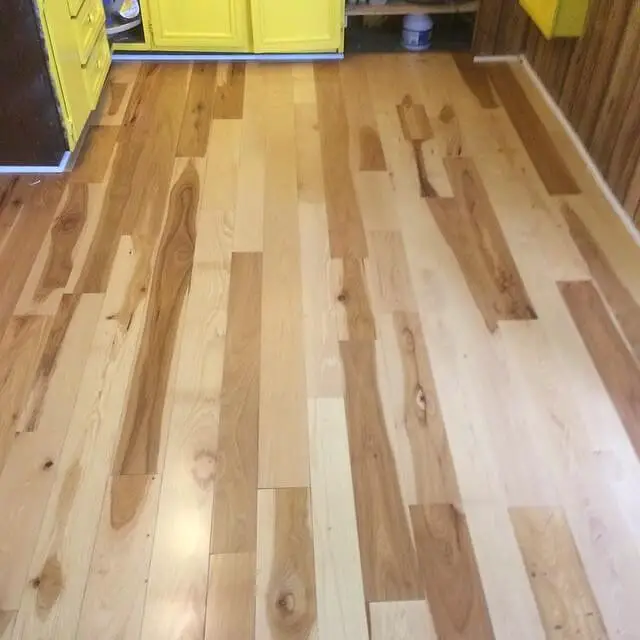
While it’s unrealistic to expect any material, including hickory wood, to be completely flawless, its natural imperfections can actually work in your favor. By acknowledging the potential drawbacks of hickory flooring, you’ll be better prepared to tackle the unique challenges that come with installing and maintaining this beautiful yet rugged type of hardwood.
The High Cost of Installation and Buying
While hickory flooring is an attractive option, one major drawback is its relatively high cost. While it may not be as pricey as other hardwood floorings, its premium features and requirements do come with a price tag. The prefinished types, for instance, can be costly due to the inherent toughness of the material, which necessitates purchasing these products over traditional hickory flooring.
Furthermore, installation costs can add significantly to the overall expense, as professional expertise is often necessary to ensure a successful installation given the floor’s resilience.
Prone to Bend
Hickory flooring is prone to premature bending, making it unsuitable for use on floors. This tendency arises when the installation process is rushed, leaving the flooring insufficient time to acclimate to its new environment. The consequences of a bent floor are severe: accidents are more likely to occur, and water can seep through the cracks, causing irreparable damage to the flooring.
Doesn’t Favor Self-Installation
While some individuals might attempt to tackle hickory installation on their own, they often find it a daunting task that requires significant time and effort. In reality, most people will opt for professional assistance to complete the job efficiently. This is because the process of cutting, sanding, and staining hickory can be labor-intensive and require a high level of skill.
From preparing the surface by applying conditioner to meticulously finishing each piece, the installation process can be quite time-consuming. Ultimately, hiring professionals to handle these tasks allows individuals to conserve their valuable time for more important pursuits.
Hickory Flooring Cost
While the cost of hickory flooring can fluctuate, it’s essential to consider various factors that influence the final price tag. The type of hickory you select and the retailer you purchase from both play a significant role in determining the cost.
Additionally, installation costs vary depending on the professional you hire, with prices ranging from $3 to $9 per square foot for solid hickory flooring, $2 to $7 per square foot for engineered flooring, and approximately $1 to $5 per square foot for laminate options. It’s crucial to budget accordingly and consider seeking estimates from professionals to ensure a more accurate calculation of the total cost. As a rough guide, installation costs typically fall between $2 to $3 per square foot.
Best Hickory Flooring Brands, Prices, And Reviews
While many individuals have a preference for established brands that offer exceptional quality floorings, hickory flooring stands out with its top-notch hardwood options. Each brand brings its unique characteristics to the table, and prices can vary depending on the retailer. To provide a comprehensive understanding of each brand’s offerings, let’s delve into some of the leading names in the industry.
For solid hickory floorings, prominent brands include Bruce, Armstrong Mohawk Jasper, and Home Legend, all of which are known for their impressive features and high-quality products. In contrast, engineered hickory flooring options are led by Heritage Mill, Millstead Shaw Floors, and Mohawk. If you’re in the market for laminate flooring, TrafficMaster is a top choice, while other notable options include Lamton Pergo or Bruce.
Bruce
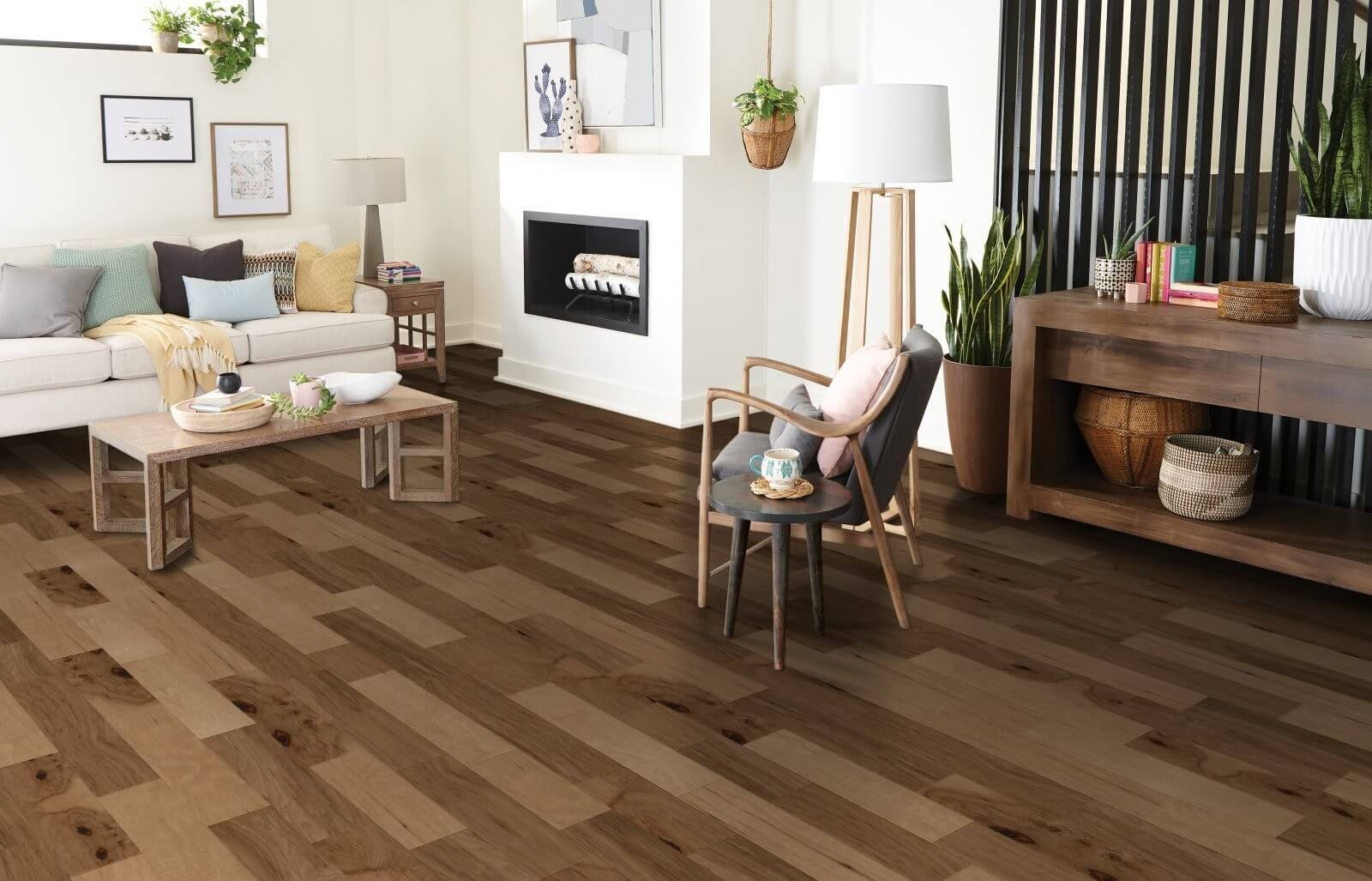
When it comes to selecting the ideal hardwood flooring for their homes, many American homeowners opt for Bruce solid hickory. This popular choice is renowned for its exceptional shine and flawless finishing, which is achieved through a combination of aluminum oxide and urethane coatings. While the cost may be a consideration for some, it’s worth noting that the price per square foot can range from around $20 to $23.50, depending on the specific product and retailer.
TrafficMaster
When searching for an affordable laminate hickory option, consider TrafficMaster as a top contender. With prices ranging from $0.68 to $1.99 per square foot, it’s an attractive choice for those on a budget. However, availability is limited to specific retailers, so be sure to scope out local outlets beforehand. One of the key benefits of TrafficMaster is its variety of textures and smooth styles, each with its own unique price point.
In fact, the brand offers three distinct categories: standard laminate, hand-scraped, and embossed. By exploring these different options, homeowners can find a hickory-inspired look that fits their needs and budget.
Mohawk
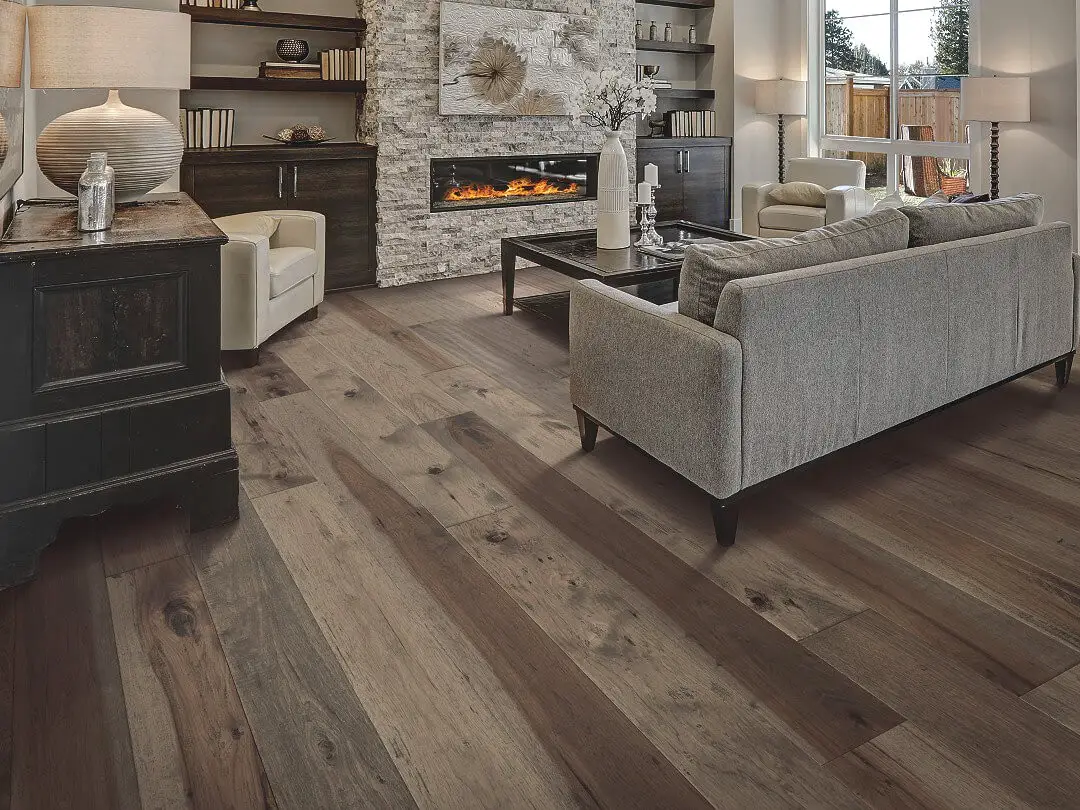
For a natural hardwood look, Mohawk brand offers a range of color combinations with narrow boards. One of its standout features is its resistance to stains and water damage, making it a durable option that can withstand the test of time. While the cost per square foot may vary depending on the location ($18.25 being the standard rate), Mohawk’s commitment to quality and longevity makes it an attractive choice for homeowners seeking a low-maintenance yet stylish flooring solution.
Armstrong
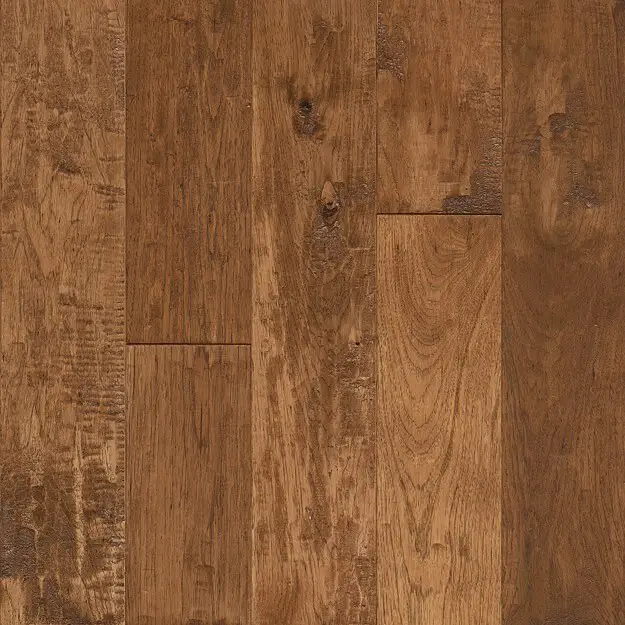
Armstrong’s reputation among homeowners and commercial users stems from their diverse hickory collection, making it easy to find a suitable option. The brand’s products boast impressive features, including an array of colors, distinctive grain patterns, and flawless finishing. With years of industry experience, Armstrong has developed a keen understanding of customer needs, ensuring their products consistently meet expectations.
Conclusion
When selecting the ideal flooring for your space, having a deeper understanding of the options can make the decision a seamless one. One standout choice is hickory flooring, which boasts an impressive array of benefits that far outweigh its drawbacks. Perhaps most notable is its ability to replicate the natural wood-like appearance at a significantly more affordable price point compared to other similar materials.
Furthermore, hickory’s advantages far surpass its disadvantages, making it a top contender for consideration. To reap the full rewards of this flooring option, it’s essential to partner with reputable hickory brands and visit their outlets to discover the highest-quality products available.
Related Posts
When it comes to home improvement, etiquette plays a significant role in ensuring a pleasant experience. One common question is whether to tip floor installers for their work. Tipping culture varies across different industries and regions, but what’s considered polite in one context might not apply universally. In the context of flooring installation, understanding gratuity etiquette can make all the difference.
Furthermore, choosing the right flooring for your home requires careful consideration of design elements, including wall colors that complement grey floors. The importance of open floor plans, the rich history of rugs, and a handy guide on selecting the ideal flooring for your house are all crucial aspects to explore when embarking on a new home project.

